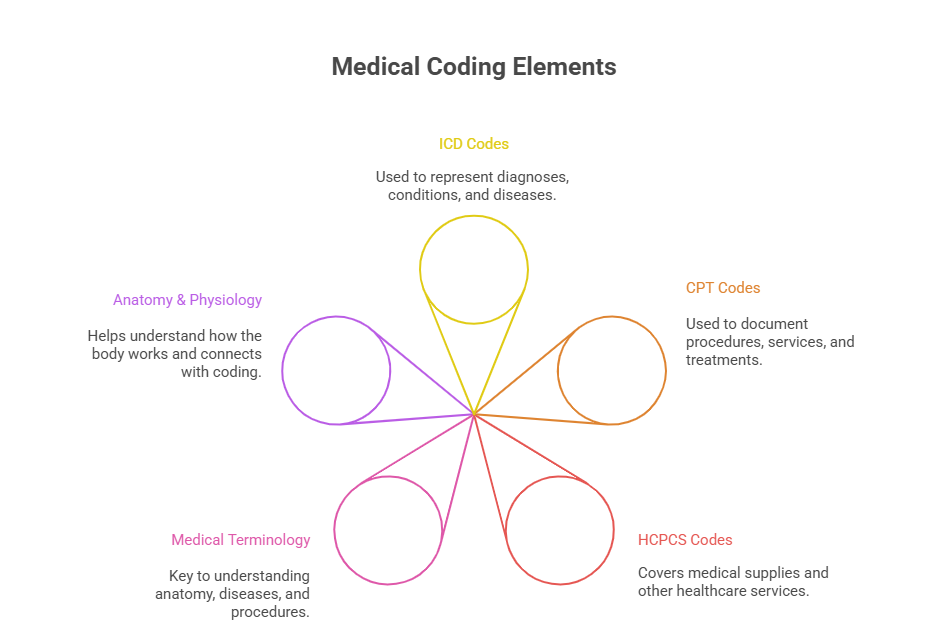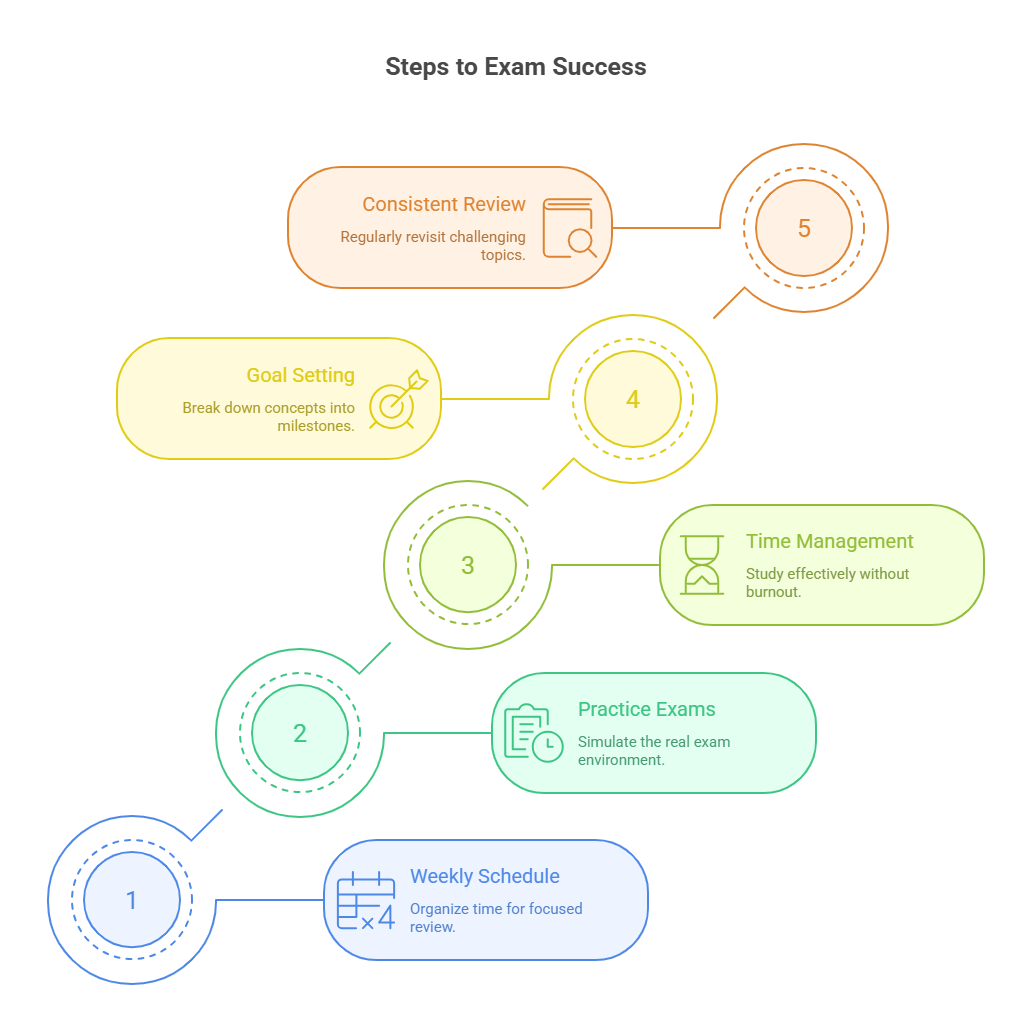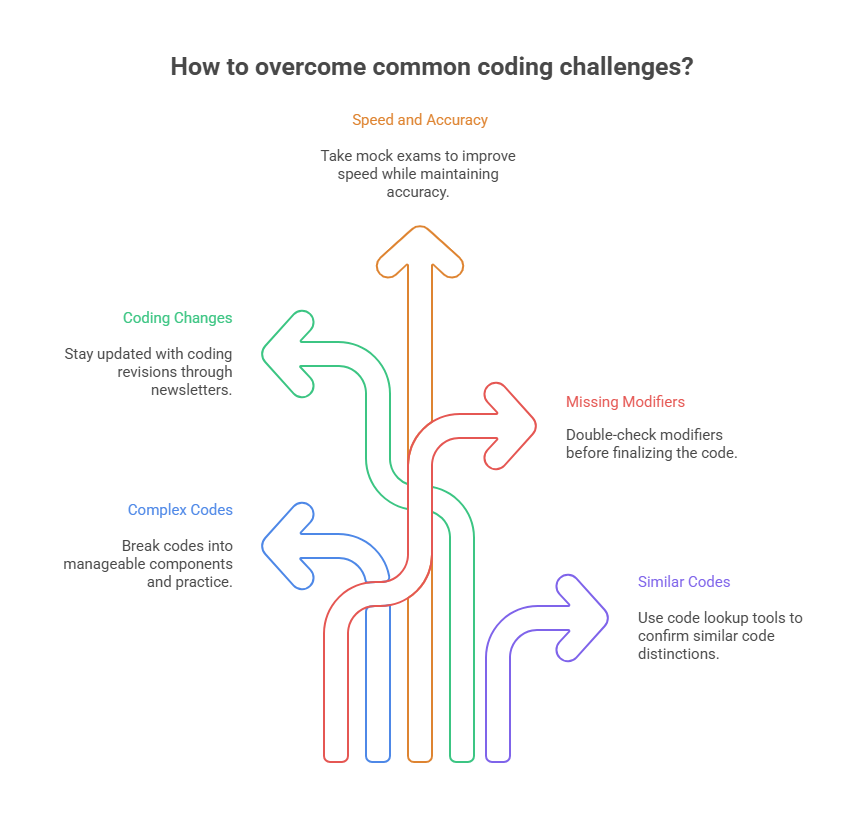Essential Study Strategies for Medical Coding Students
Medical coding plays a crucial role in healthcare administration, ensuring accurate documentation and proper billing for services provided. ICD, CPT, and HCPCS codes form the backbone of this system, linking diagnoses and treatments to insurance companies and healthcare providers. For students aiming for certification, mastering these coding systems is essential for success in the field.
The key to excelling as a medical coder lies in strategic studying. Understanding medical terminology, anatomy, and physiology is just as important as grasping the complexities of the coding systems. This guide will explore essential study strategies, including how to create a study plan, utilize practice exams, and leverage tools like flashcards and coding platforms. By following these strategies, you’ll be well-prepared to tackle the challenges of the certification exam and thrive in your new career.
Key Concepts in Medical Coding
Understanding ICD, CPT, and HCPCS Codes
At the core of medical coding are the ICD, CPT, and HCPCS codes, each serving a unique function in documenting healthcare services.
ICD Codes (International Classification of Diseases): These codes are used to describe diagnoses. Understanding the different ICD-10 categories is essential, as they cover everything from chronic diseases to infectious conditions.
CPT Codes (Current Procedural Terminology): These are used to document procedures and services. They’re crucial for billing, and they need to be matched correctly with diagnoses for accurate claims processing.
HCPCS Codes (Healthcare Common Procedure Coding System): These codes include both CPT codes and additional codes for medical supplies, drugs, and ambulatory services.
Knowing these three coding systems and their specific rules will help you assign accurate codes and avoid mistakes.
Importance of Medical Terminology
A strong foundation in medical terminology is vital for any medical coding student. This includes understanding prefixes, suffixes, and root words, which are used to build medical terms. Familiarity with common terms related to anatomy, diseases, and procedures will allow you to:
Decode medical reports more accurately
Match the correct codes to procedures and diagnoses
Minimize errors during coding and billing
As you study, regularly reviewing medical terminology alongside coding systems will improve your retention and speed when translating healthcare services into codes.
Anatomy and Physiology Knowledge
A good grasp of anatomy and physiology is essential for understanding how diseases and conditions affect the human body. For coding students, it’s necessary to:
Identify body systems and their functions (e.g., cardiovascular, respiratory, nervous systems)
Understand the relationship between organs, conditions, and treatments
Recognize medical procedures in the context of body parts and functions
By understanding basic human anatomy, students can accurately map diagnoses and procedures to the corresponding codes, which is critical for precise and compliant medical coding.
How to Create a Study Plan
Building a Weekly Study Schedule
A well-organized study schedule is crucial for medical coding students. The sheer volume of information to learn can feel overwhelming, but breaking it down into manageable chunks makes it more achievable. Start by:
Allocating specific time blocks each week for ICD, CPT, and HCPCS review.
Rotate study topics to avoid burnout—focus on one coding system per session.
Set small, measurable goals for each session, such as mastering 5 ICD codes or completing 10 practice questions.
Be sure to prioritize more challenging topics, but also incorporate lighter review sessions for medical terminology or anatomy. This helps you stay on track without feeling overwhelmed.
Utilizing Practice Exams and Mock Tests
Practice exams and mock tests are an essential part of exam preparation. They help you familiarize yourself with the exam format and identify areas for improvement. By simulating the exam environment, you can:
Test your speed and accuracy in coding different medical procedures and diagnoses
Review mistakes thoroughly to understand the reasoning behind correct answers
Build confidence in your ability to complete the exam on time
Set a goal of taking a practice test every 2-3 weeks. Analyze your performance and adjust your study plan accordingly to target weak areas. Using online coding platforms often provides access to real-world examples of exams.
Time Management and Focus Techniques
Time management and focus are essential when studying for the medical coding exam. To optimize your study sessions:
Use the Pomodoro Technique: Work in 25-minute intervals, followed by a 5-minute break. This helps maintain concentration and productivity.
Remove distractions: During study sessions, turn off social media notifications and set a quiet study environment.
Practice self-assessment: At the end of each week, reflect on what you’ve learned and adjust your focus for the following week.
Establishing a study routine with these techniques ensures that you’re staying on track and maximizing retention. Consistent, focused study time is key to mastering medical coding.
Study Tools and Resources for Success
Online Medical Coding Platforms
Leveraging online medical coding platforms is one of the most effective ways to gain hands-on practice and enhance your coding skills. Platforms like AAPC and ICD-10 Trainer provide real-time coding exercises and detailed explanations for ICD, CPT, and HCPCS codes. These resources allow you to:
Practice coding scenarios in a simulated environment, mirroring real-world tasks
Gain access to study guides and exam preparation tools
Track your progress and identify areas needing improvement
Using online platforms offers structured learning paths and ensures you're constantly engaging with updated coding practices, making them an essential tool for exam preparation.
Flashcards, Apps, and Coding Workbooks
Flashcards and apps are excellent for reinforcing medical terminology, anatomy knowledge, and code memorization. Some tools you can use include:
Quizlet: Create and share custom flashcards to test ICD, CPT, and HCPCS codes
Medical Coding Flash Cards: A traditional workbook offering code and medical term drills
Coding Companion App: Helps with quick reference and mobile study sessions
These tools help reinforce what you’ve learned, allowing for quick recall and application during exams. Integrating these tools into your study routine can significantly boost retention while providing flexibility for on-the-go learning.
Joining Study Groups and Forums
Joining study groups and online forums provides additional perspectives and a support network throughout your preparation journey. Engage in discussions on platforms like:
AAPC’s Medical Coding Community
Reddit’s Medical Coding Subreddit
Facebook study groups for medical coding students
These communities allow you to ask questions, share resources, and learn from others’ experiences. Collaborating with peers helps you identify common challenges, share study tips, and gain insights from those who have already passed their exams. Additionally, study groups often hold mock exams, providing practice under real exam conditions and helping you build confidence.
| Tool | Benefit/Use |
|---|---|
| Online Coding Platforms | Hands-on practice with real-world scenarios. |
| Flashcards | Perfect for memorizing medical terms and codes. |
| Coding Workbooks | Guided exercises that simulate exam coding tasks. |
| Apps | On-the-go study for ICD and CPT coding practice. |
| Study Groups | Collaborate with peers for shared learning and insights. |
The Importance of Consistent Practice in Medical Coding
Consistent practice is the cornerstone of mastering medical coding and ensuring accuracy when handling real-world scenarios. The vastness of ICD, CPT, and HCPCS codes requires students to stay engaged and constantly review new material to retain information. Without regular practice, the complexity of the codes can overwhelm students, leading to errors in coding tasks and claims processing.
Building Confidence Through Repetition
The key to success in medical coding is repetition. The more you practice coding scenarios, the more familiar you’ll become with the structure of diagnosis codes and procedure codes. To build confidence:
Work through coding exercises daily, even if only for 30 minutes. This helps solidify your memory of the codes and their respective uses.
Utilize coding platforms that offer a wide variety of real-world coding examples, allowing you to practice in different settings.
Complete mock exams on a regular basis. This not only helps with time management but also improves speed and accuracy under exam conditions.
Mastering Common Coding Scenarios
In addition to theoretical study, medical coding students must practice real-world scenarios to truly master the subject. This means learning to:
Code common diagnoses such as diabetes, hypertension, and common cancers, and understand the nuances involved in procedure codes like surgeries and lab tests.
Practice with complex cases such as multi-visit treatments or uncommon procedures that require careful attention to detail and knowledge of multiple codes.
Consistency ensures you are well-prepared to handle the variety of coding challenges you will face in professional settings.
| Practice Strategy | Purpose/Outcome |
|---|---|
| Daily Coding Practice | Reinforces knowledge of ICD, CPT, and HCPCS codes. |
| Using Coding Platforms | Provides real-world practice with various coding scenarios. |
| Mock Exams and Time Management | Builds confidence in speed and accuracy for exams. |
| Regular Review of Mistakes | Identifies weak areas and ensures improvement over time. |
| Focus on Common and Complex Scenarios | Helps you practice both basic and advanced coding tasks. |
| Track Progress and Set Goals | Monitor improvement, set specific goals, and adjust study focus. |
| Study Groups and Peer Feedback | Collaborate with peers to enhance understanding and resolve challenges. |
| Mobile Apps and Flashcards | Flexible study tools for reinforcing coding knowledge on-the-go. |
Overcoming Common Coding Challenges
Dealing with Complex Codes
One of the biggest challenges for medical coding students is dealing with complex codes, especially those found in the ICD-10 and HCPCS systems. These codes often involve multiple components, including diagnosis modifiers and treatment specifics. To overcome this challenge:
Break codes into manageable parts: Focus on the primary code first, then add any modifiers or additional descriptors.
Practice frequently with real-world scenarios to familiarize yourself with complex situations.
Use tools like code lookup websites and online references to verify codes before committing them.
Time management is key when working with complex codes. Using a step-by-step approach will help reduce errors and improve your speed, especially when working under exam time constraints.
Staying Updated with Coding Changes
The world of medical coding is constantly evolving, with new codes being introduced and old codes being updated every year. Staying updated with these changes is critical for both exam preparation and long-term career success. Here’s how to stay on top:
Subscribe to coding newsletters like those from AAPC or AHIMA, which provide regular updates on code revisions and guidelines.
Use official coding manuals (like the CPT 2025 or ICD-10 CM) to familiarize yourself with the latest code changes.
Join online forums or study groups where you can discuss recent updates and clarify doubts with peers.
Being proactive about these changes will ensure you're prepared for the evolving nature of coding and maintain accuracy in real-world applications.
Avoiding Common Mistakes
While studying for the certification exam, students often make a few common mistakes that can be easily avoided with practice and careful attention:
Mixing up similar codes: Always ensure you double-check ICD-10 codes to avoid choosing the wrong one, especially with codes that look alike.
Rushing through questions: Take your time to read each scenario thoroughly and ensure you're matching the correct diagnosis or procedure code.
Neglecting to check modifiers: Always verify if modifiers are required for the procedure or diagnosis code. Missing these can lead to incorrect claims and reimbursement issues.
To avoid these pitfalls, create a checklist for code review during mock exams. Familiarize yourself with common code pairs and modifiers, and practice error-checking to catch mistakes early.
How Our Medical Billing and Coding Certification Prepares You
Hands-On Practice with Real Scenarios
The Medical Billing and Coding Certification by AMBCI offers hands-on practice with real-world coding scenarios, ensuring that you are well-prepared for the practical demands of the job. Through simulated coding exercises, you’ll learn how to:
Accurately assign ICD, CPT, and HCPCS codes to a variety of medical conditions and procedures
Use realistic case studies that mimic actual patient files
Ensure that coding practices comply with HIPAA regulations and insurance requirements
This practical approach helps you not only understand the theory behind coding but also equips you with the ability to navigate the complexities of real-life coding challenges confidently.
Expert Guidance and Support
Our certification program provides expert guidance throughout your training journey. From coding specialists who provide insights into the latest industry trends to one-on-one mentorship, we ensure that you receive the support needed to succeed. The program includes:
Access to personalized coaching sessions to clarify doubts and reinforce learning
Interactive discussions on common coding issues and real-world examples
Opportunities to work with industry professionals to gain practical insights
With the Medical Billing and Coding Certification by AMBCI, you’ll be ready to tackle coding tasks with confidence and land your first role as a certified billing and coding professional.
Frequently Asked Questions
-
The Medical Billing and Coding Certification by AMBCI typically takes 3–6 months to complete, depending on the student's pace and availability. The program is designed to be flexible, offering self-paced learning, but students can opt for more intensive schedules if they wish to complete the course faster. During this period, students will engage in hands-on practice and complete mock exams to ensure they're well-prepared for real-world coding tasks.
-
This certification program covers the three major coding systems in healthcare: ICD-10 (for diagnosis coding), CPT (for procedures and services), and HCPCS (for medical supplies and equipment). Students will receive in-depth training on these systems, learning how to accurately assign codes to various medical conditions and procedures. Mastery of these coding systems is essential for anyone looking to work in medical billing and coding.
-
No prior experience in healthcare is required to begin the Medical Billing and Coding Certification by AMBCI. The program is designed for beginners and covers everything from basic medical terminology to advanced coding concepts. However, some background knowledge in anatomy and physiology can be beneficial. The program ensures that all students, regardless of prior experience, gain the knowledge and skills needed to succeed in the field.
-
You’ll know you’re ready for the certification exam when you consistently score well on practice tests and feel confident in your ability to apply coding systems to real-world scenarios. Throughout the program, students are given access to mock exams and coding exercises that replicate the actual exam environment. Our instructors will also provide personalized feedback, identifying areas for improvement and ensuring you are well-prepared for the exam.
-
Yes, students in the Medical Billing and Coding Certification by AMBCI program have access to ongoing support from expert instructors and industry professionals. You’ll also have access to study materials, coding tools, and a dedicated student portal where you can find additional resources like practice exams, study guides, and webinars. The goal is to ensure you feel fully supported throughout your learning journey.
-
Absolutely. The Medical Billing and Coding Certification by AMBCI is designed to be flexible, with the ability to study at your own pace. Many students choose to continue working while pursuing the certification, as the program allows for part-time or full-time learning based on individual schedules. However, consistency and a dedicated study plan will help you stay on track and complete the program in a timely manner.
-
Obtaining the Medical Billing and Coding Certification by AMBCI significantly enhances your job prospects by validating your skills and knowledge in the field. Certified professionals are in high demand across healthcare settings, including hospitals, clinics, insurance companies, and medical offices. The certification demonstrates your ability to accurately code diagnoses and procedures, a critical function for proper billing and reimbursement. As a certified professional, you’re also eligible for higher salaries and career advancement opportunities.
Conclusion
The Medical Billing and Coding Certification by AMBCI offers a comprehensive pathway for those seeking to excel in healthcare administration. With a well-structured curriculum, hands-on practice, and expert guidance, you’ll gain the coding proficiency and real-world experience necessary to succeed in this high-demand field. By mastering ICD-10, CPT, and HCPCS codes, and supplementing your learning with medical terminology and anatomy knowledge, you'll be prepared to tackle the complexities of medical coding with confidence.
The certification not only prepares you for the exam but also enhances your career prospects by equipping you with the skills and knowledge that employers are seeking. Whether you're looking to enter the field or advance within it, this certification offers the tools and resources to set you apart. Hands-on practice, personalized support, and flexible study options ensure that your path to success is both efficient and attainable.
Take the next step in your career today by enrolling in the Medical Billing and Coding Certification by AMBCI and unlock a world of career opportunities in healthcare administration.




